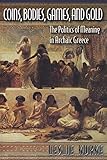Coins, Bodies, Games, and Gold : The Politics of Meaning in Archaic Greece / Leslie Kurke.
Material type: TextPublisher: Princeton, NJ : Princeton University Press, [2021]Copyright date: ©1999Description: 1 online resource (408 p.) : 9 halftonesContent type:
TextPublisher: Princeton, NJ : Princeton University Press, [2021]Copyright date: ©1999Description: 1 online resource (408 p.) : 9 halftonesContent type: - 9780691223322
- Coins, Greek -- Greece -- History
- Meaning (Psychology) -- Greece
- HISTORY / Ancient / Greece
- Aigina
- Alkidamas
- Alkman
- Alyattes
- Anacharsis
- Astyages
- Bohannan, Paul
- Cassin, E
- Cheops
- Corinth
- Deinomenids
- Exekias
- Gentili, B
- Gould, J
- Great King
- Hartog, F
- Hipponax
- Isocrates
- Kambyses
- Kraay, Colin
- Lucian
- Maiandrios
- Neer, R
- Nitokris
- Oroites
- Palamedes
- Pantaleon
- Phalaris
- Scythians
- Syloson
- Telesarchos
- Theodoros
- Theseus
- Will, Edouard
- anthropology
- autochthony
- burial
- daric
- dokimos
- education
- epinikion
- hero cult
- hetaira-symposia
- histor
- iconography
- metallurgy
- oligarchy
- palaistra
- pharaoh
- structuralism
- symposium
- thalassocracy
- 938 22
- DF222.2
- DF222.2 .K87 1999eb
- online - DeGruyter
| Item type | Current library | Call number | URL | Status | Notes | Barcode | |
|---|---|---|---|---|---|---|---|
 eBook
eBook
|
Biblioteca "Angelicum" Pont. Univ. S.Tommaso d'Aquino Nuvola online | online - DeGruyter (Browse shelf(Opens below)) | Online access | Not for loan (Accesso limitato) | Accesso per gli utenti autorizzati / Access for authorized users | (dgr)9780691223322 |
Browsing Biblioteca "Angelicum" Pont. Univ. S.Tommaso d'Aquino shelves, Shelving location: Nuvola online Close shelf browser (Hides shelf browser)

|

|

|

|

|

|

|
||
| online - DeGruyter Battling Western Imperialism : Mao, Stalin, and the United States / | online - DeGruyter Vampires, Dragons, and Egyptian Kings : Youth Gangs in Postwar New York / | online - DeGruyter Thorstein Veblen : Theorist of the Leisure Class / | online - DeGruyter Coins, Bodies, Games, and Gold : The Politics of Meaning in Archaic Greece / | online - DeGruyter Democracy in Suburbia / | online - DeGruyter Raiding the Land of the Foreigners : The Limits of the Nation on an Indonesian Frontier / | online - DeGruyter The Politics of Market Reform in Fragile Democracies : Argentina, Brazil, Peru, and Venezuela / |
Frontmatter -- Contents -- Illustrations -- Preface -- Acknowledgments -- Abbreviations -- INTRODUCTION Toward an Imaginary History of Coinage -- Part One DISCOURSES -- CHAPTER 1 The Language of Metals -- CHAPTER 2 Tyrants and Transgression: Darius and Amasis -- CHAPTER 3 Counterfeiting and Gift Exchange: The Fate of Polykrates -- CHAPTER 4 Kroisos and the Oracular Economy -- Part Two. PRACTICES -- CHAPTER 5 The Hetaira and the Porné -- CHAPTER 6 Herodotus's Traffic in Women -- CHAPTER 7 Games People Play -- CHAPTER 8 Minting Citizens -- CONCLUSION. Ideology, Objects, and Subjects -- Bibliography -- Index Locorum -- General Index -- ABOUT THE AUTHOR
restricted access online access with authorization star
http://purl.org/coar/access_right/c_16ec
The invention of coinage in ancient Greece provided an arena in which rival political groups struggled to imprint their views on the world. Here Leslie Kurke analyzes the ideological functions of Greek coinage as one of a number of symbolic practices that arise for the first time in the archaic period. By linking the imagery of metals and coinage to stories about oracles, prostitutes, Eastern tyrants, counterfeiting, retail trade, and games, she traces the rising egalitarian ideology of the polis, as well as the ongoing resistance of an elitist tradition to that development. The argument thus aims to contribute to a Greek "history of ideologies," to chart the ways ideological contestation works through concrete discourses and practices long before the emergence of explicit political theory. To an elitist sensibility, the use of almost pure silver stamped with the state's emblem was a suspicious alternative to the para-political order of gift exchange. It ultimately represented the undesirable encroachment of the public sphere of the egalitarian polis. Kurke re-creates a "language of metals" by analyzing the stories and practices associated with coinage in texts ranging from Herodotus and archaic poetry to Aristotle and Attic inscriptions. She shows that a wide variety of imagery and terms fall into two opposing symbolic domains: the city, representing egalitarian order, and the elite symposium, a kind of anti-city. Exploring the tensions between these domains, Kurke excavates a neglected portion of the Greek cultural "imaginary" in all its specificity and strangeness.
Mode of access: Internet via World Wide Web.
In English.
Description based on online resource; title from PDF title page (publisher's Web site, viewed 07. Nov 2022)


